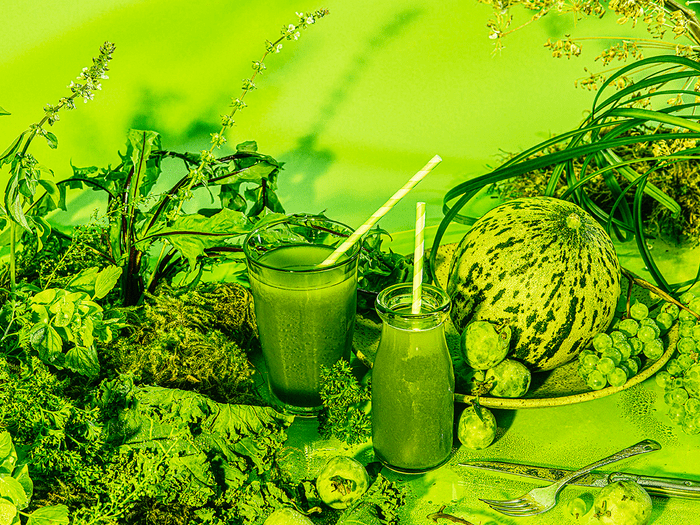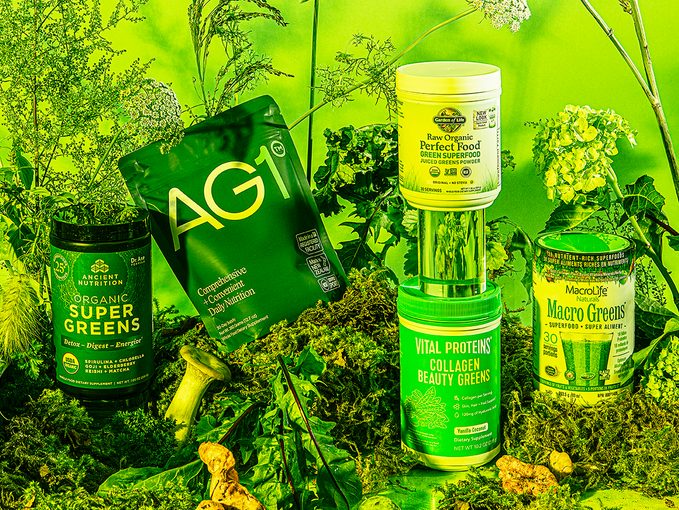Is Drinking Your Greens as Healthy as Eating Them?

These brands promise all of your daily nutrients delivered in one convenient scoop of powder—just drop it into a glass of water and stir. But are you drinking the new Kool-Aid?
Perhaps you’ve yet to mix a scoop of Athletic Greens into a cup of water, but chances are you’ve heard of the brand. Ads for the powder are popping up on every other podcast lately, with hosts commending them for having a rich nutrient profile. They contain an impressive 75 vitamins, minerals and “whole-food sourced nutrients,” which, according to the company, is “all you really need, really.”
There’s nothing new about the idea of reaping the goodness of green vegetables by drinking them, not chewing them. “Everyone’s always trying to find ways to make eating your greens easier,” says Abbey Sharp, a registered dietitian in Toronto. Athletic Greens has been around for more than a decade, while green smoothies, juices and one-shot “wellness boosters” have been on the scene for even longer.
Products like Athletic Greens are made with dehydrated vegetables and other health-boosting ingredients, like ashwagandha, an adaptogenic herb. They’re buzzy now because of, yes, the incessant ads, but also because we’re seeing greater, more enchanting health claims attached to them: “Promotes gut health! Supports immunity! Boosts energy! Helps recovery!” It raises the question: Is drinking your greens really just as healthy—or even healthier—than consuming them whole?
Before we answer that, let’s review why green vegetables are often considered to be the cream of the health food crop. Green veggies, particularly dark ones, are rich in essential minerals like iron, magnesium and calcium, as well as important vitamins like C, K and many B vitamins. Some green vegetables also contain phytonutrients, such as beta-carotene and lutein, which can help protect your cells and prevent diseases. According to Canada’s Food Guide, you need to eat a variety of colourful veggies and fruit each day, including at least one daily serving of dark green veggies. That could be one cup of spinach or a half cup of broccoli, for example. While it sounds easy enough, we all know that finding and prepping vegetables to eat every day isn’t always convenient—and that’s where green powders may come in handy.
“I see them as multivitamins,” says Sharp. If you’re not getting the daily requirements of vitamins and minerals from your meals, then nutrient-packed powdered greens could help you meet those needs, Sharp says, especially if you’re unable to cook much at home.
Because conventional green juices (whether from the grocery store or a juice bar) are full of sugar, powdered greens make a healthier alternative. Plus, a powder is much easier to prep (and clean!) than anything requiring you to break out a juicer or blender. All it takes is a scoop of the greens and an 8-ounce glass of water, and you have a moss-green drink that can taste pretty good, depending on who you ask: Green powders seem to fall somewhere on the flavour scale between tropical fruit and broccoli. (Athletic Greens is “essenced” with vanilla and pineapple, though some reviewers have described it as “broccoli pretending to be a milkshake.”)
But contrary to Athletic Greens’ slogan, the powder actually isn’t “all you really need, really.” It’s not a replacement for whole foods, says Sharp. “Green powders like Athletic Greens may be competitive to whole foods in their nutrient profiles, but they’re missing essentials like fibre and calories,” she says. “This is one of the main reasons we eat vegetables.”
Fibre is good for your gut—it prevents constipation by helping to keep food moving through the digestive system. It’s found in raw vegetables, whether eaten whole or blended into a smoothie, but not in vegetable juices. With juicing, all fibrous materials are extracted, says Sharp. Same goes for powdered greens.
And that other essential element missing? Calories. “Diet culture makes us think calories are bad, but calories are energy,” says Sharp. And we get energy from eating food. “If you want a more energizing choice [than powdered greens], have a cup of green tea with some actual breakfast,” she says. This will help you feel stimulated and satiated for longer because of the calorie intake.
While Athletic Greens are certainly the most popular powdered greens today, they’re one of the more expensive options, at about USD $99 per month, plus taxes and $9 in shipping costs to Canada. (Note: You’ll save a bit if you subscribe to recurring deliveries.)
When shopping for powdered greens, be skeptical of marketing ploys and scrutinize the ingredients, Sharp recommends. It may sound like you’re getting all the listed superfoods, but you don’t know how much of those superfoods are actually in the blends—and it is not possible for there to be a clinically significant dose of each ingredient in every single scoop. “We can say a product contains broccoli if it contains a minuscule amount of it,” says Sharp. “There’s no minimum amount of the vegetable that needs to be in that product.”
If you do purchase powdered greens, look for a product that’s been third-party tested. That means an independent company has tested the product for purity (it’s free of heavy metals and other contaminants), and for transparency and accuracy (in terms of the levels of nutrients stated on the label).
Whether or not you have a nutrient deficiency, Sharp says, powdered greens could still help you feel good, even if there isn’t a scientific reason behind it. “I think the placebo effect is a beautiful thing,” she says. “If you can afford to entertain it, and you’re feeling better, that’s great.”

Ancient Nutrition: This brand is formulated with 25 ingredients, like alfalfa grass juice, beet root and flax seed, as well as other superfoods, like probiotics and adaptogenic herbs. It’s also vegan, gluten-free, non-GMO, and certified organic.
Ancient Nutrition Organic Super Greens, $48, iherb.com
Athletic Greens: Gwyneth Paltrow, the grand dame of Goop herself, gave Athletic Greens a social-media stamp of approval. Devotees like that the powder is made without GMOs, pesticides, artificial colours, preservatives, gluten or dairy.
AG1 Pouch 30-Day Supply, USD $99, athleticgreens.com
Garden of Life: For a vegan option that’s less expensive than Athletic Greens but still loaded with nutrients (and raking in five-star reviews), try this certified organic, non-GMO pick. It contains 40 nutrients and includes probiotics—which can help support healthy digestion.
Garden of Life Raw Organic Perfect Food Green Superfood, $44, iherb.com
Vital Proteins: One of the most recognized collagen supplements around has a greens version. Aside from skin-boosting ingredients like hyaluronic acid, it’s formulated with organic greens (like wheat grass and kale) and coconut water, plus probiotics for better gut health.
Vital Proteins Collagen Beauty Greens
Vanilla Coconut, $40, iherb.com
Macro Green: This pick contains 38 nutrient-rich superfoods and probiotics. It’s also non-GMO, vegan, gluten-free, and dairy-free.
MacroLife Naturals Macro Greens Nutrient Rich Superfood, $66, well.ca




